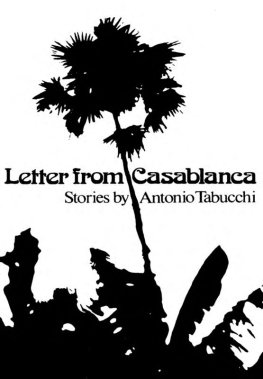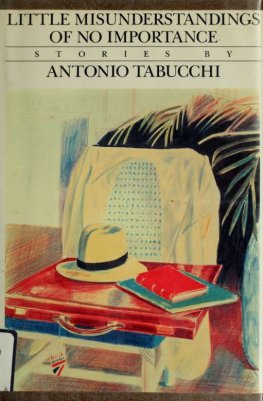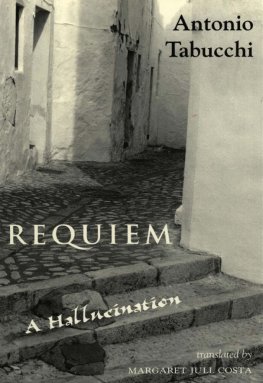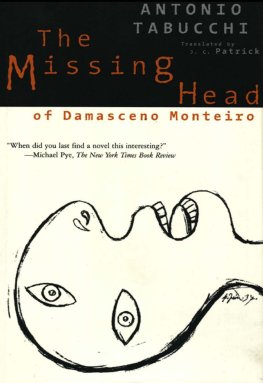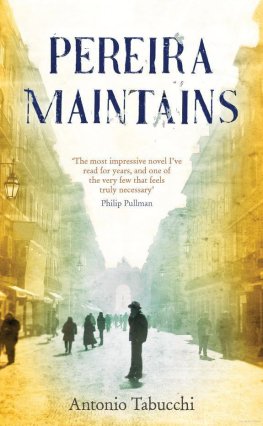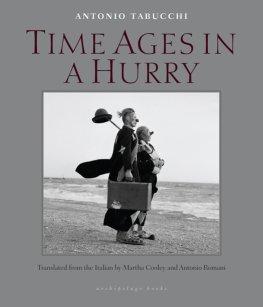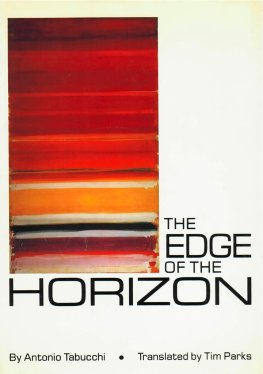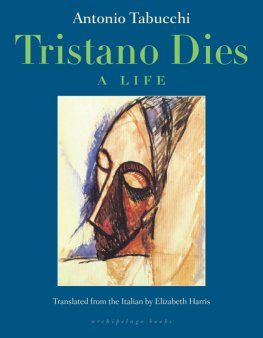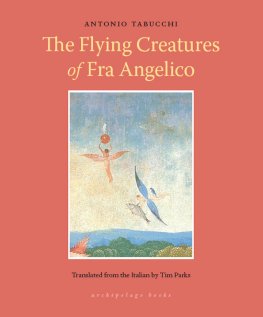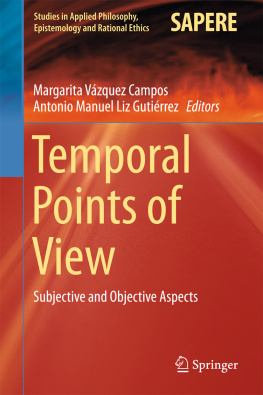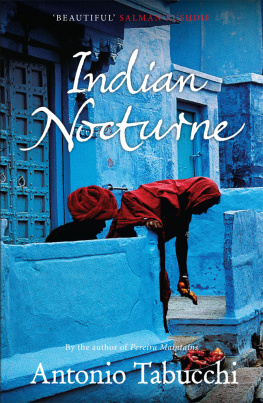Antonio Tabucchi - Letter from Casablanca
Here you can read online Antonio Tabucchi - Letter from Casablanca full text of the book (entire story) in english for free. Download pdf and epub, get meaning, cover and reviews about this ebook. year: 1986, publisher: New Directions, genre: Prose. Description of the work, (preface) as well as reviews are available. Best literature library LitArk.com created for fans of good reading and offers a wide selection of genres:
Romance novel
Science fiction
Adventure
Detective
Science
History
Home and family
Prose
Art
Politics
Computer
Non-fiction
Religion
Business
Children
Humor
Choose a favorite category and find really read worthwhile books. Enjoy immersion in the world of imagination, feel the emotions of the characters or learn something new for yourself, make an fascinating discovery.
- Book:Letter from Casablanca
- Author:
- Publisher:New Directions
- Genre:
- Year:1986
- Rating:5 / 5
- Favourites:Add to favourites
- Your mark:
- 100
- 1
- 2
- 3
- 4
- 5
Letter from Casablanca: summary, description and annotation
We offer to read an annotation, description, summary or preface (depends on what the author of the book "Letter from Casablanca" wrote himself). If you haven't found the necessary information about the book — write in the comments, we will try to find it.
Letter from Casablanca — read online for free the complete book (whole text) full work
Below is the text of the book, divided by pages. System saving the place of the last page read, allows you to conveniently read the book "Letter from Casablanca" online for free, without having to search again every time where you left off. Put a bookmark, and you can go to the page where you finished reading at any time.
Font size:
Interval:
Bookmark:
Antonio Tabucchi
Letter from Casablanca
LETTER FROM CASABLANCA
Lena,
I dont know why I begin this letter talking to you about a palm tree when you havent heard anything about me for eighteen years. Perhaps because there are many palm trees here. I see them from my hospital window waving their long arms in the torrid wind along the blazing avenues that disappear in whiteness. In front of our house, when we were children, there was a palm tree. Maybe you dont remember it because it was pulled down, if my memory does not fail me, the year the event took place in 1953, therefore, I think in summer. I was ten years old.
We had a happy childhood, Lena. You cant remember it, and no one could talk to you about it. The aunt with whom you grew up cant know about it. Yes, of course, she can tell you something about Papa and Mama, but she cant describe for you a childhood that she didnt know and which you dont remember. She lived too far away, up there in the north. Her husband was a bank clerk. They considered themselves superior to the family of a signalman, a level-crossing keeper. They never came to our house.
The palm tree was pulled down following a decree by the Minister of Transport which maintained that it impeded the view of the trains and could provoke an acccident. Who knows what accident that palm tree, grown so high, could provoke, with a tuft of branches that brushed our second-floor window? From the signalmans house, what might be slightly annoying was its trunk, a trunk thinner than a light pole, and it certainly could not impede the view of the trains. Anyway, we had to pull it down, nothing could be done about it, the land wasnt ours. One night at supper Mama, who from time to time had grand ideas, proposed to write a letter personally to the Minister of Transport, signed by all the family, a kind of petition. It went like this:
Dear Mr. Minister: In reference to the circular number such-and-such, protocol such-and-such, concerning the palm tree situated on the small piece of land in from of the signal house number such-and-such for the Roma-Torino line, the family of the signalman informs Your Excellency that the above-mentioned palm tree does not constitute any obstacle to the view of the trains in passage. We beg you, therefore, to leave the above-mentioned palm tree standing, it being the only tree on the land apart from a roadside pergola of vines over the door and it being much loved by the children of the signalman, especially being company for the baby who, being by nature delicate, is often confined to bed, and at least can see a palm tree through the windowpane rather than only air, which makes it sad, and to bear witness to the love that the children of the signalman have for the above-mentioned tree, sufficeth it to say that they have christened it and do not call it palm tree, but call it Josephine, owing this name to the fact that we, having taken them once to the cinema in the city to see The Talking Dead with Tot, in the film they saw the famous French Negro singer of the above-mentioned name who danced with a most beautiful headgear made of palm leaves, and since, when there is wind, the palm tree moves as if it is dancing, our children call it their Josephine.
This letter is one of the few things that remain to me of Mama. It is the rough copy of the petition we sent. Mama wrote it in her handwriting in my composition notebook and so, by fortuitous chance, when I was sent to Argentina, I took it along without knowing it, without imagining the treasure that that page would become for me later.
Another thing that remains to me of Mama is an image, but you can hardly see her. Its a photograph that Signor Quintilio took under the pergola of our house around the stone table. It must be summer. Seated at the table there are Papa and Signor Quintilios daughter, a thin girl with long braids and a flowered dress. I am playing with a wooden gun, and I am pretending to shoot at a target. On the table there are some glasses and a bottle of wine. Mama is coming out of the house with a soup tureen. She has just entered the photograph that Signor Quintilio has just clicked. She came in by chance and was moving. For this reason she is a little out of focus and in profile, and it is difficult even to recognize her, so much so that I prefer to think of her as I remember her. Because I remember it well, that year. I am speaking of the year in which the palm tree was pulled down. I was ten years old, it was surely summer, and the event happened in October. A person possesses perfectly the memory of when he was ten years old, and I will never be able to forget what happened that October. But Signor Quintilio do you remember him? He was the bailiff at a farm about two kilometers from the signal house, where in May we used to go to pick cherries. He was a happy, nervous little man who always told jokes. Papa made fun of him, because under fascism he had been Vice-federal, or something of the kind, and he was ashamed. He would shake his head, say that it was water under the bridge, and then Papa would begin to laugh and give him a slap on the back. And his wife do you remember her? Signora Elvira, that big, sad woman. She suffered terribly from the heat. When she came to dinner with us she brought a fan. She sweated and panted, then she sat outside under the pergola, asleep on the stone bench with her head leaning on the wall. Nothing woke her, not even the passing of the freight trains.
It was splendid when they came Saturday after supper. Sometimes Signorina Palestro came too, an old maid who lived alone in a kind of dependent villa on the farm, surrounded by a battalion of cats. She had a mania for teaching me French because as a girl she had been tutor to the children of a count. She always said, Pardon, and Cest dommage, and her favorite exclamation, used in all situations to underline an important fact or simply if her glasses fell, was Eh, l, l! Those evenings Mama sat down at the little piano. How she held herself at that piano was a testimony to her upbringing, to her well-to-do girlhood, to her chancellor father, to summers spent in the Tuscan Apennines. What stories she told us about her vacations! And then she had graduated in domestic science.
If you knew, during my first years in Argentina, how much I wished I had lived those vacations! I wanted them so much and I imagined them so vividly that sometimes a strange witchcraft came over me, and I remembered vacations spent at Gavinana and at San Marcello. We were there, Lena, you and I, as children. Only you, instead of being you, were Mama as a little girl, and I was your brother and I loved you very much. I remembered when we went to a stream below Gavinana to catch tadpoles. You that is, Mama had a net and a funny big hat with a brim like those of the Sisters of St. Vincent. You ran straight ahead, chattering, Run! Run! The tadpoles are waiting! What fun! and it seemed to me to be the funniest rhyme, and I laughed like crazy. Bursts of laughter prevented me from following you. Then you disappeared into the chestnut wood near the stream and shouted, Catch me! Catch me! At that point I did my very best and caught up with you. I took you by the shoulders, you gave a little cry, and we fell down. The ground was sloping and we began to roll over, and then I embraced you and whispered to you, Mama, Mama, hug me tight, Mama, and you hugged me tight. While we rolled over, you had become Mama as I knew her. I smelled your perfume, I kissed your hair, everything intermingled grass, hair, sky and at that moment of ecstasy the baritone voice of Uncle Alfredo said to me, Now then, nio, are the platinados ready? They were not ready, no. I found myself in the wide-open jaws of an old Mercedes with a box of tacks in one hand and a screwdriver in the other. The floor was studded with blue spots of oil mixed with water. Whatever is this boy dreaming of! Uncle Alfredo said good-naturedly, and gave me an affectionate slap.
Font size:
Interval:
Bookmark:
Similar books «Letter from Casablanca»
Look at similar books to Letter from Casablanca. We have selected literature similar in name and meaning in the hope of providing readers with more options to find new, interesting, not yet read works.
Discussion, reviews of the book Letter from Casablanca and just readers' own opinions. Leave your comments, write what you think about the work, its meaning or the main characters. Specify what exactly you liked and what you didn't like, and why you think so.

